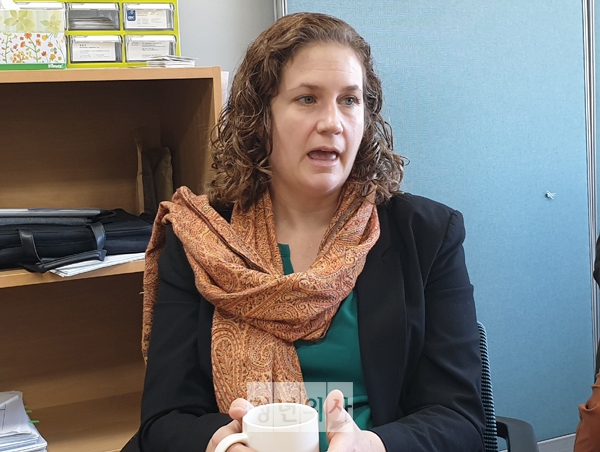Korea has turned its attention toward biosurveillance as a means to strengthen its state quarantine system since it suffered from poor control over epidemics, such as Middle East Respiratory Syndrome (MERS) for people, and foot-and-mouth disease for livestock.
The term biosurveillance, which was coined by the U.S. government, is an aspect of biodefense relating to the detection of bioterrorism threats, infectious disease epidemic related to both humans and animals.
Korea Biomedical Review met with Professor Jennifer B. Nuzzo of Johns Hopkins University during the Biosurveillance Symposium 2019, to discuss in detail what biosurveillance is and how the U.S. has been conducting such activities to get a better grasp of how Korea should proceed with establishing its biosurveillance system.
Professor Nuzzo is an expert in biosurveillance, who has actively commented on various advisory committees organized by the U.S. government and Congress to establish a biological surveillance system.

Question: Biosurveillance is quite a new term in Korea. What does it mean, and why is it important?
Answer: There is some debate in each field about what exactly covers biosurveillance.
From my point of view, biological surveillance is a set of actions taken to collect, analyze, and interpret information to establish an early detection system and to support epidemics, outbreaks, and other public health emergencies.
The definition of the type of information we have to look at is also broad. There are three types of information we have to look traditional, non-traditional, and environmental.
Traditional indicators will be things that have been done for a long time in the field of public health, such as collecting the number of certain sick patients, while non-traditional indicators refer to information that is not collected in the health sector such as school absenteeism and what drugs people are buying.
What is important to note is that besides people, animal data indicators should be included in both traditional and non-traditional information. This is because while many believe only livestock are likely to be of interest in public health, wild animals are also expected to affect the health of the public as much as livestock.
Finally, there are environmental information indicators. Recently, we have discovered and studied that various environmental information, such as weather, environment, and humidity, affect our health.
Biosurveillance is important as we live in a world where we are likely to experience a public health crisis. Infectious diseases are on the rise, and they are easy to spread across the globe as technology develops.
Biosurveillance allows us to gather information about where and what is happening and respond quickly.
Although Korea views biosurveillance as a new concept, officials here have actually been using some of the elements for a long time. However, I believe that Korea saw that its existing system was not enough after the MERS outbreak.
America was no different. We recognized the absence of a system after an outbreak of anthrax terrorism and are working to improve our biosurveillance capacity.
Q: Since the U.S. has already established a biosurveillance system, I am curious if there were any difficulty in the process?
A: As the U.S. is a federalist country, most U.S. biosurveillance is conducted by state or local governments. This means that the federal government has given money to state and local health departments to develop the ability to gather and analyze data since 2001
But there are still problems, the most difficult of which is collecting information. It is always challenging to get information from different government agencies because the reasons for gathering information differs for every.
It also makes it difficult for different departments to share that information while respecting the communities in which they serve.
When it comes to data integration, we still don't have the exact definition of integration. For true data integration, we need first to define what integration is.
Efficient integration will vary from disease to disease, as the kind of data needed varies by each disease.
I believe that big data can be a solution to this problem, but it's also essential to be careful when applying the platform for data integration.
Financing biosurveillance is also an important aspect. After the terrorist attack in Sep. 11 2009, many people were worried about what could happen to the U.S.
Therefore, the government spent an abundant amount to boost up its biosurveillance platform. Over time, however, other politically important issues emerged, and the funding for biosurveillance decreased significantly.
Biosurveillance requires long-term investment, and one of the main factors that governments have to consider is the people who operate the system. If governments want to continue using experts, they have to pay their salaries.
Q: As you mentioned, financing for a government project can change depending on the ruling political party. Does this mean that the biosurveillance platform can be affected by the regime?
A: The big field of health protection, which includes biosurveillance, is of great importance to any government or any political party in the U.S. This is because no leader wants the absence of information in events that adversely affect the health of the people.
Therefore, it doesn't seem to have changed much compared to other areas. However, the grants have decreased as the U.S. revenue has declined.
Q: Do you have any advice for Korea regarding its effort to build a biosurveillance system?
A: If data integration is the Korean government's goal, Korea should first pick one area and experience integration.
This is because if you aim too big at the beginning, it may be overwhelming and unclear what the priorities are.
My recommendation is to start with infectious diseases that come from food-borne pathogens as the field is economically influential, while various government agencies are affected.
If it goes well, it will be easy to move to other fields.

